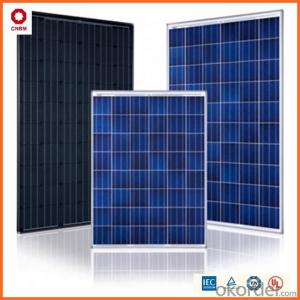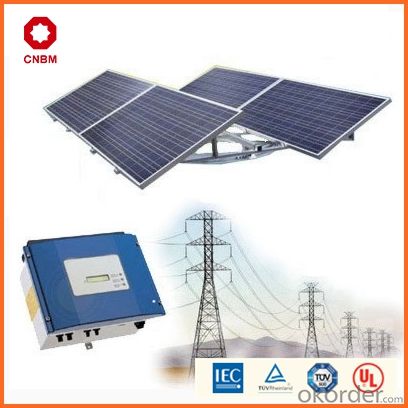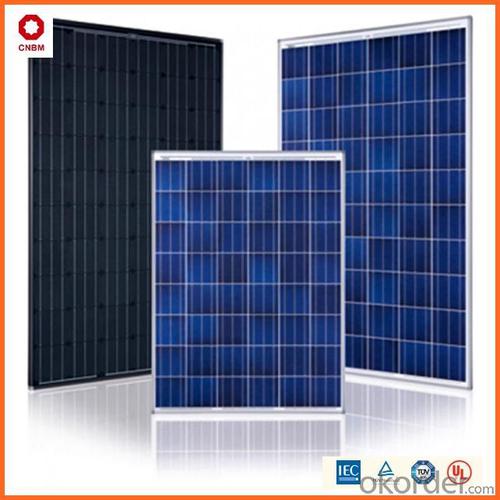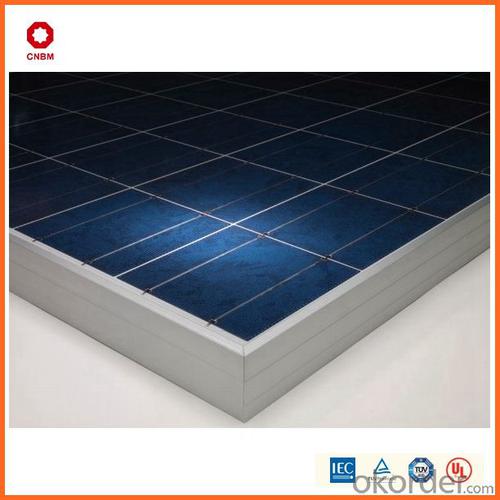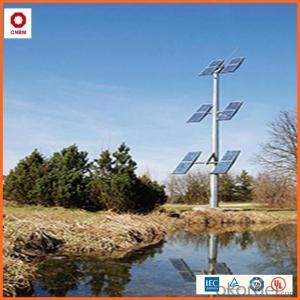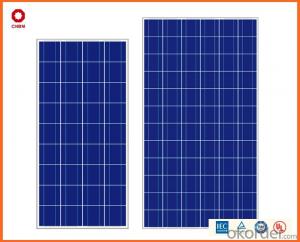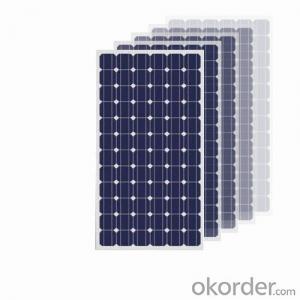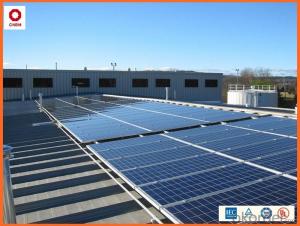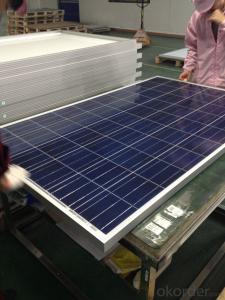Solair Solar Energy Systems - Small Solar Panel 55w Poly with Good Quality
- Loading Port:
- China main port
- Payment Terms:
- TT OR LC
- Min Order Qty:
- 1 watt
- Supply Capability:
- 10000000 watt/month
OKorder Service Pledge
OKorder Financial Service
You Might Also Like
Specification
Product Description:
Hot Sale !!! Quality and Safety of Small Poly Solar Panel 35~85w
1. Rigorous quality control meets the highest international standards.
2. High-transmissivity low-iron tempered glass, strong aluminium frame.
3. Using UV-resistant silicon.
4. IS09001/14001/CE/TUV/UL
Warranties of Small Poly Solar Panel 35~85w
1. 10 years limited product warranty
2. 15 years at 90% of the minimal rated power output
3. 25 years at 80% of the minimal rated power output
Specification
Characteristics of Poly solar panels CNBM (245-320W) | |||||
Max Power Voltage Vmp(V) | 30.3 | 30.8 | 31.1 | 31.4 | 31.85 |
Max Power Current Imp(A) | 7.60 | 7.64 | 7.73 | 7.81 | 7.85 |
Open Circuit Voltage Voc(V) | 36.1 | 36.6 | 37 | 37.3 | 37.68 |
Short Circuit Current Isc(A) | 8.50 | 8.55 | 8.65 | 8.75 | 8.85 |
Max Power Pm(W) | 230W | 235W | 240W | 245W | 250W |
Temperature Coefficient of Cells Poly solar panels CNBM (245-320W) | |
NOCT | 45± 2 |
Temperature Coeffucients of Isc | 0.0492 |
Temperature Coeffucients of Voc | -0.3374 |
Temperature Coeffucients of Voc | -0.4677 |
Mechanical Data of Poly solar panels CNBM (245-320W) | |
Dimension | 1638 × 982 × 40 mm |
Weight | 19.5 kg |
No. of Cells and Connections | 60 (6 ×10) |
Tolerance | 0 ~ + 5 W |
Cell | Monocrystalline Cell 156 × 156 mm |
Packing | 624 Pcs/40ft(H) Container |
Limits of Poly solar panels CNBM (245-320W) | |
Operating Temperature | -40 to +85 |
Storage Temperature | -40 to +85 |
Max System Voltage | 1000VDC(IEC) / 600VDC(UL) |
Features of our products:
• High conversion efficiency mono/poly-crystalline amorphous silicon solar cells
• Modules incorporate high performance bypass diodes to minimize the power drop caused by shading
• High transmittance, low-iron tempered glass
• High performance EVA encapsulant to prevent destroying and water.
• AI frame: without screw, corner connection. 8 holes on the frame can be installed easily
• Good performance of preventing from atrocious weather such as wind and hails
• Certifications: CE IEC TUV VDE UL, Class I
• 10 years 90% power output warranty

Shipping of Small Poly Solar Panel 35~85w
By Sea | Delivery from Shanghai or Ningbo seaport |
By Air | Departure from Shanghai Pudong Airport |
By Express | Post by DHL, EMS, UPS, TNT. |
- Q: Can solar energy systems be used for powering electric vehicle ride-sharing services?
- Yes, solar energy systems can be used for powering electric vehicle ride-sharing services. Solar energy systems, such as solar panels, can generate electricity from sunlight and convert it into usable energy. This energy can then be stored in batteries or directly used to power electric vehicles. By utilizing solar energy, ride-sharing services can reduce their dependence on fossil fuels and decrease their carbon footprint. Solar-powered electric vehicle charging stations are already being deployed in various locations around the world, providing clean and renewable energy for charging electric vehicles. These charging stations can be integrated into ride-sharing service networks, allowing electric vehicles to be charged with solar energy during their downtime or while waiting for passengers. Solar energy systems offer several advantages for powering electric vehicle ride-sharing services. Firstly, solar energy is abundant and free, making it a cost-effective and sustainable option in the long run. Additionally, solar panels have a long lifespan and require minimal maintenance, reducing operational costs for ride-sharing companies. Moreover, by using solar energy, ride-sharing services can promote renewable energy adoption and contribute to a greener and more sustainable transportation sector. However, it is important to consider the limitations of solar energy systems. Solar panels can only generate electricity during daylight hours and their efficiency is affected by factors such as weather conditions and the angle of sunlight. Therefore, ride-sharing companies that rely solely on solar energy may need to supplement their power supply with grid electricity or other renewable energy sources to ensure uninterrupted service. In conclusion, solar energy systems can definitely be used to power electric vehicle ride-sharing services. By harnessing the power of the sun, ride-sharing companies can reduce their environmental impact, lower operating costs, and contribute to the transition towards a clean and sustainable transportation system.
- Q: How does solar energy compare to other renewable energy sources?
- Solar energy is often considered one of the most accessible and abundant renewable energy sources. Unlike wind or hydroelectric power, solar energy can be harnessed virtually anywhere, making it widely applicable. Additionally, solar panels have a long lifespan, require minimal maintenance, and produce no greenhouse gas emissions during operation. While solar energy may have limitations in terms of efficiency and intermittency, it remains a promising and increasingly competitive alternative to other renewable energy sources.
- Q: What is the difference between a grid-tied and off-grid solar energy system?
- A grid-tied solar energy system is connected to the local electricity grid, whereas an off-grid solar energy system operates independently and is not connected to the grid. In a grid-tied system, solar panels are used to generate electricity from the sun, which is then converted into usable AC power through an inverter. This electricity is first consumed by the household or business where the system is installed. If the solar panels generate more electricity than is being consumed, the excess power is fed back into the grid, often resulting in a credit or payment from the utility company. During times when the solar panels are not generating enough power, electricity is drawn from the grid. This ensures a continuous and reliable power supply, with the grid acting as a backup. On the other hand, an off-grid solar energy system is designed to operate independently from the grid. It typically includes a battery bank to store excess electricity generated by the solar panels, which can then be used during times when the panels are not producing enough power. Off-grid systems also require an inverter to convert the DC power from the solar panels into usable AC power. These systems are commonly used in remote locations where connecting to the grid is costly or not feasible. The main difference between the two systems lies in their level of independence and connection to the grid. Grid-tied systems offer the advantage of being able to sell excess electricity back to the utility company, allowing for potential cost savings or even revenue generation. They also provide a reliable power supply, as grid power can be used when solar production is low. On the other hand, off-grid systems provide complete energy independence and are not reliant on the grid. However, they require careful planning and sizing to ensure sufficient power is available at all times, as there is no backup from the grid. Additionally, off-grid systems often require more complex equipment, such as batteries, to store and manage electricity.
- Q: Can a solar energy system be used to power outdoor lighting?
- Yes, a solar energy system can be used to power outdoor lighting. Solar panels collect and convert sunlight into electricity, which can be stored in batteries and used to power outdoor lights during the night. This offers an environmentally-friendly and cost-effective solution for outdoor lighting.
- Q: Can a solar energy system power an entire household?
- It is possible to power an entire household solely with solar energy using a solar energy system. The capacity of the system to do so depends on various factors, including the system's size, the amount of sunlight available, the household's energy consumption, and the efficiency of the solar panels. If the system is properly sized and well-designed, it can generate enough electricity to meet all the household's energy needs, including powering appliances, lights, heating and cooling systems, and other electrical devices. Excess energy produced by the panels can be stored in batteries for use during times of low sunlight or at night. Furthermore, surplus electricity from the solar system can be fed back into the grid, allowing households to earn credits or receive compensation from utility companies. Therefore, with the correct setup, it is indeed possible to solely power an entire household with solar energy.
- Q: Can solar energy systems be used for powering sports stadiums or arenas?
- Yes, solar energy systems can definitely be used for powering sports stadiums or arenas. In fact, many stadiums and arenas around the world have already started utilizing solar energy as a sustainable and cost-effective source of power. Solar energy systems, such as solar panels, harness the power of the sun and convert it into electricity. This electricity can then be used to power various components of sports stadiums or arenas, including lighting, scoreboards, sound systems, and even charging stations for electric vehicles. The amount of solar energy required to power a stadium will depend on its size, energy needs, and the level of energy efficiency implemented. There are several benefits to using solar energy in sports stadiums or arenas. Firstly, it is a clean and renewable source of energy, which helps reduce greenhouse gas emissions and dependence on fossil fuels. This aligns with the growing global focus on sustainability and combating climate change. Secondly, solar energy can provide long-term cost savings. While the initial installation costs may be higher compared to traditional energy sources, the operational and maintenance costs of solar panels are relatively low. Over time, the energy generated by solar panels can offset electricity expenses, leading to significant savings in the long run. Moreover, solar energy systems can also serve as a visible symbol of environmental responsibility and inspire fans, athletes, and communities to adopt sustainable practices. Sports stadiums and arenas are often high-profile venues, attracting large audiences and media attention. By adopting solar energy, these facilities can showcase their commitment to clean energy and inspire others to follow suit. In summary, solar energy systems can be effectively used for powering sports stadiums or arenas. They offer a clean, renewable, and cost-effective alternative to traditional energy sources, while also promoting sustainability and inspiring others to embrace clean energy solutions.
- Q: Can solar energy systems be installed without professional help?
- No, solar energy systems should always be installed by professionals to ensure proper and safe installation, as well as to maximize their efficiency and longevity.
- Q: Can a solar energy system be installed on a hotel or resort?
- Certainly, hotels and resorts have the ability to install a solar energy system. In fact, establishments all over the world have already adopted solar energy and have incorporated solar panels on their roofs or in the nearby areas. Solar energy systems offer various benefits to hotels and resorts, including cost savings, decreased environmental impact, and improved sustainability practices. By harnessing the power of the sun, hotels and resorts can generate clean and renewable electricity to fulfill a significant portion of their energy requirements. This can result in substantial savings on electricity bills, particularly in regions with abundant solar energy potential. Furthermore, solar energy systems can help reduce dependence on traditional energy sources like fossil fuels, thus mitigating the risks associated with fluctuating energy costs. The installation of solar panels on hotel and resort roofs or in open spaces is also an effective way to promote environmental sustainability. Solar energy is a clean and renewable power source that produces no greenhouse gas emissions or air pollutants during operation. By transitioning to solar energy, hotels and resorts can significantly decrease their carbon footprint and contribute to global efforts in combating climate change and promoting a greener future. Moreover, embracing solar energy can boost reputation and attract environmentally conscious guests. Many travelers actively seek out eco-friendly accommodations that prioritize sustainability practices. By installing a solar energy system, hotels and resorts can demonstrate their commitment to environmental stewardship and appeal to a growing market of eco-conscious tourists. In conclusion, hotels and resorts can undoubtedly install solar energy systems, which offer several advantages including cost savings, reduced environmental impact, and increased appeal to eco-conscious travelers. As the world continues to prioritize renewable energy sources, hotels and resorts can play a crucial role in the transition to a sustainable future by embracing solar energy.
- Q: What is the role of solar cookers in solar energy systems?
- Solar cookers play a crucial role in solar energy systems as they harness sunlight to cook food without the need for traditional fuel sources. They utilize the heat from the sun to heat and cook food, reducing the reliance on fossil fuels and minimizing environmental impact. Solar cookers are cost-effective, sustainable, and provide a clean and renewable alternative for cooking, making them an essential component of solar energy systems.
- Q: How do solar energy systems store excess energy?
- Solar energy systems store excess energy through the use of batteries or other energy storage technologies. This allows the surplus energy generated by the system during periods of high sunlight to be stored and used later when sunlight is not available, such as at night or during cloudy days.
Send your message to us
Solair Solar Energy Systems - Small Solar Panel 55w Poly with Good Quality
- Loading Port:
- China main port
- Payment Terms:
- TT OR LC
- Min Order Qty:
- 1 watt
- Supply Capability:
- 10000000 watt/month
OKorder Service Pledge
OKorder Financial Service
Similar products
Hot products
Hot Searches
Related keywords


